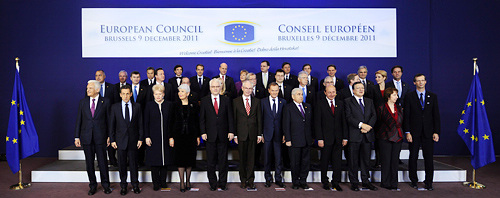|
 |
|
SHOW OF UNITY: EU heads of state after the European Council meeting, at the EU headquarters in Brussels, Belgium, December 9 (CFP) |
The EU Summit ended on December 9 in Brussels with two surprises: EU leaders agreed on establishing a new "fiscal compact" based on inter-governmental treaties to cure the ongoing debt crisis, and British Prime Minister David Cameron decided to keep the United Kingdom out of that compact.
This summit was a key event at a crucial moment. Although the compact is only a conceptual thing, it represents the unprecedented determination of the EU to solve the debt crisis. The summit maps out the future of EU financial integration. Unfortunately, this achievement will not release pressure brought by the debt crisis within a short time.
EU leaders' agreement on the fiscal compact includes the establishment of EU fiscal regulation and provides direction for the next step of EU integration. Liu Mingli, a researcher with the Institute of European Studies under the China Institutes of Contemporary International Relations, said to Beijing Review that the decision proved the EU's active attitude on curing its fiscal disease.
"Honestly speaking, the EU has acted very passively to stop the leaks. Now it has a clear idea of how to root out the problem," Liu said, "But there will be a lot of work to be done before such a compact can be established."
European Council President Herman Van Rompuy announced on December 9 that 26 EU states would join the compact based on "intergovernmental treaties." Strengthening fiscal discipline through the fiscal compact would be "much more rapid and easier to approve and ratify," Van Rompuy said.
This is a breakthrough on strengthening fiscal supervision in euro zone member states, said Lu Jian, a researcher with the China Macroeconomic Research Center at Peking University. He pointed out that the compact is an alternative of a previous plan of amending the EU treaty and setting up a fiscal stability union, which was vetoed by Britain. It showed Europe's active tendency of resisting crisis and protecting integration. "The EU has displayed its experience and technique as a mature developed economy," he concluded.
Stressing a strong new European unity on fiscal policy, the compact will require member states to translate it into their constitutions or equivalents, reinforcing the rules on excessive deficit procedures by making them more automatic, according to Van Rompuy. He also said that, under the fiscal compact, member states will have to submit their draft budgetary plans to the European Commission, the EU's executive arm.
Lu concluded that the summit also made some progress on strengthening rescue measures for the debt crisis. It applauded the latest European Financial Stability Facility (EFSF) plans, deciding to enlarge its capital resource by issuing Partial Protection Certificates (PPC) of sovereign debt nations and establishing a Co-Investment Fund (CIF). Moreover, the summit declared the EU will conduct more cooperation with the IMF. The EU is going to provide a 200 billion euro loan to enable the IMF's rescue function. The IMF will play a more important role in coping with the European debt crisis.
"There is a long way to go before establishing the compact," said Liu. He explained that it would take some months for EU members to approve the compact. The 26 countries also need to discuss the details when carrying out the compact, for example, how to operate it and who will perform the executive functions.
Even when the compact is established, it will not function soon or release current pressure. Some debtor nations inevitably will be hurt during the crisis before the EU's new fiscal principles and regulations can take effect. As Van Rompuy admitted, "the inter-governmental treaties are handicapped somehow, but a full-fledged treaty change is not possible."
The summit also reflected current differences inside the EU. Britain has shown its stance on the debt crisis: As a non-euro zone EU member, it will not be dragged down by the debt crisis in the euro zone. For the UK, keeping its distance from the EU also keeps it outside the decision-making circle on the continent. Meanwhile, an EU without the UK will not be as powerful as before.
"The UK's decision was understandable. Prime Minister Cameron must put his country's interests first. And the UK's choice will not actually cause separation inside the EU," said Liu to Beijing Review.
| 